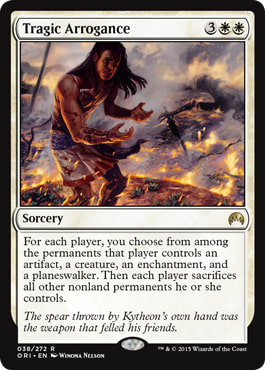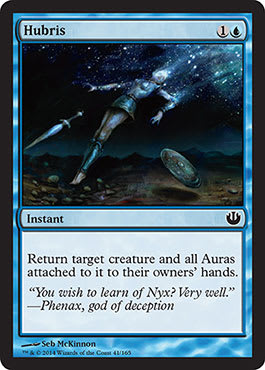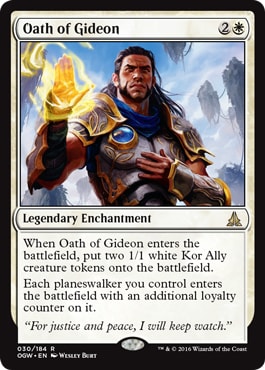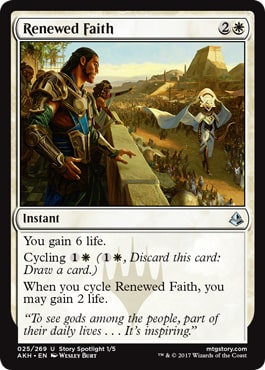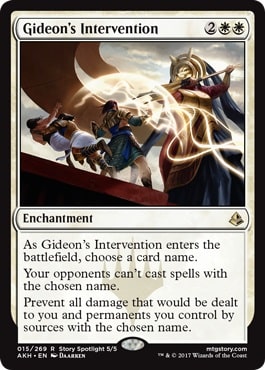Previously, and Also
Where does Gideon's story start? It's kind of a weird question to answer, and it's an important one. Figuring out where his story starts is part of how we do a close reading of his narrative. Where the story starts and ends tells us a lot about its theme, because it shows us what growth and change occurs — if any — and from there we can figure out what the story is trying to say through that development.
So does Gideon's story begin with The Purifying Fire, or with Magic Origins?
It's problematic, not in the weird, broken Internet sense of "bad but I won't just use the word 'bad' for some reason" but in the sense that it poses a bunch of problems that we have to work through. That's, it turns out, what happens when you have an existing starting point for a character, realize huge swaths of your fanbase haven't read it, and decide to give that character a totally new (contradictory) starting point. The end result isn't necessarily bad, but it is, you know, problematic.
Of course, the easiest solution here is to just say Origins is the starting point, and Gideon lied to Chandra about his past, for whatever reason. He must have, if the continuity is to be coherent. The backstory he gives Chandra involves a mentor who teaches him law magic and instructs him in his nature as a Planeswalker before he ascends, only to be killed later by a pyromancer. It's a simple enough backstory, one that lasts only a few sentences in TPF. It's largely contradicted by his Origins story, however, in which Gideon has no knowledge of his Planeswalker nature before his ascension, there's no pyromancer in sight, and the focus is far more on Gideon's "irregulars," a group of former criminals that he turns into a fighting force to defend his home city.
If we're striving for a kind of Watsonian internal consistency, then, we've got to paper over this ambiguity by saying that Gideon is an unreliable source here. But this papering changes TPF and Gideon's overall arc, for the sake of a change that is, fundamentally, extracanonical. In the real world, we know that the Creative Team made the decision to alter Gideon's backstory. Gideon, not being a real person, couldn't "lie" in TPF, in part because this alternate backstory wouldn't be written for many years. So the team made a change here . . . what might have been the reason?
Part of it might be to rework where Gideon's arc is going and what its thematic content is. Gideon's Origins story is one of hubris, one of Gideon, indestructable and overconfident, hurling a magic spear at a god only to have it casually flicked back at him, blowing up all his friends. It's an ok story. The whole thing comes off a bit like the team trying to convince themselves along with everyone else that Gideon really does totally make sense on Theros, as though the only way to make his origin work is to make it as Greekly Tragic as possible. But there's some interesting stuff here to be sure. If nothing else, it emphasizes the fact that Gideon's indestructibility is personal and only over time, only in recent stories, has he managed to extend that aura of protection to others.
One of the results of this new origin, then is that Gideon's desire to protect others is stymied by his own personal limitations. Let's reread some of the other stories in light of this:
The Purifying Fire is now sort of odd, as Gideon in this story is more interested in protecting people in a more abstract, broad sense. Rather than rushing in to defend individuals, Gideon is a political thinker, backing the Order of Heliud because he thinks they'll effect systemic changes on the planes they control.
His bizarre back and forth between Ravnica and Zendikar is more poignant. Gideon's inability to extend his protective force to everything around him becomes a neurosis here, a traumatic failing that he compensates for through debilitating overwork.
His choice to seek out Jace and, eventually, the rest of the Gatewatch also makes quite a bit of sense in this context. Gideon can't make everyone indestructible, so as loathe as he seems to be to make alliances with these other 'walkers, he needs to find some way of extending his will, if not his direct magical abilities.
Taking Origins as the starting point and interpreting everything through the lens of that story as his introduction has major effects on how we read the rest of his stories, basically. Some stories are elevated, others maybe don't fit together quite as well. We can treat Gideon's character in a totally Watsonian way, resolve things by papering over contradictions with in-world logic, but if we just do that I think we miss out on the chance to consciously work through the problem of how and why each individual story is being altered through this new context.
That becomes an issue when some of the elements end up being a little contradictory. I'm not going to pretend to be unbiased here — I like TPF a lot, and I find Gideon's central conflict there, between constantly wanting something to follow and believe in, and being unable to shed the skepticism and clear vision that forces him to understand the moral failings of the groups he joins up with. But I don't think you have to necessarily side with one starting point or the other to see that elements from the two don't quite mesh, not just because of continuity but because of theme.
Like, does it really make sense for Gideon's arc to explore his failure to resist the allure of powerful ideologues . . . BUT ALSO explore his hubris in the face of divinity? I mean, the storyline currently seems to want it both ways, with Gideon's joining the Trials being a kind of failure to see clearly like his fellow Gatewatch members, but his resistance to Hazoret is depicted as an ominous moment of hubris. So, to put it somewhat reductively, is his failure to challenge power the problem, or is his challenge to power the problem?
Figuring out where the story is supposed to start (or, perhaps, where it's going to end . . . though I increasingly suspect we won't see any of the Gatewatch die, exactly, on Amonkhet) can help parse this out, but here we're back to the problem of whether we should read the story chronologically from Gideon's viewpoint, or chronologically from a publishing standpoint.
I'm not going to resolve that problem at all, actually. I mean, if nothing else, resolving that problem would require me to make some kind of guess at where the story is going, and this fandom's already full to the brim with people speculating wildly about the future. And beyond feeling very certain that Gideon's storyline in the near future will finally intersect with the long hinted at characters of Marit Lage and, of course, Parcher, I'm going to be coy about what I think might be coming. Being able to predict things isn't exactly my point here anyway. I'm way less interested in getting the fandom to the point where it can predict things more accurately (though I mean . . . it'd be NICE . . . ) than I am in showing why making sense of a serial narrative like this is, well, problematic!
So rather than pass judgment on Gideon's storyline, I want to offer a bunch of possible readings.
Like: Can we read Gideon's storyline in the context of much of the rest of Magic as particularly suspicious of faith? Is Gideon the ultimate expression of a trend that's long existed within Magic where gods turn out to be false in some sense, either because they're Planeswalkers, totally made up, Black mana death clouds angry about being friendzoned straight out of Dominaria, or real but ultimately corrupt or corrupted? This reading, drawing heavily on The Purifying Fire, Amonkhet, and the card version of Return to Ravnica, suggests that putting your faith in a higher power is ultimately a fool's game.
Can we read Gideon's story in the context of Theros? Is his storyline going to be a Greek Tragedy proper in which his fatal flaws and his hubris lead him to challenge an immortal, only to be crushed, finally? This reading might suggest that ultimately even if we'd like to struggle against our fate and find our own path to goodness, our limited mortal nature makes us helpless in the face of evil, and perhaps even deserving of our eventual fall, bringing our disaster on ourselves (though admittedly few of us have probably done anything quite as hairbrained as showing up on a plane ruled by an ancient dragon planeswalker god-emperor, so it's kind of up in the air, I guess, just how applicable this is).
Can we read Gideon's story more specifically as one of falling into the same mistakes over and over, an inversion of Chandra's narrative in details but a direct parallel in form? (And also of Urza's, and Liliana's, and maybe Teferi's, and . . . well a lot of Planeswalkers, really.) Cursed is the man, after all, who forgets his own past. (But which past? Which starting point?)
Can we read Gideon's story cohesively after all? Can we see his story as being about the hopeless conflict between arrogance and hubris on the one hand, and blind obedience on the other, and the struggle to thread the needle between those opposite poles in a multiverse where Planeswalkers all too frequently seek out godlike authority? Maybe the problematics of Gideon's storyline are just what makes his character conflict interesting, and Origins and TPF are only in conflict inasmuch as Gideon himself might fall equally into one failure state or another. After all, something being problematic doesn't mean it's awful, it just means we've got to parse out the problems it offers us.
My point with this series of articles is not that Watsonians trying to patch cracks in Gideon's narrative, or narratives generally, is inherently bad, or even that I'm going to have the same problems with the plot other folks do (some people might not see inconsistencies here at all!), it's just that I think it's important not to get so caught up in presuming the internal logical consistency of a world that we miss broader implications, like Aurelia's repressive power, or like the fact that . . . well . . . look let's be real, Gideon doesn't come out of this looking great, does he? Even if he eventually becomes disillusioned, this sets him up as repeatedly playing the sucker for authoritarians. What does that say about people of faith? Or, more broadly, about people who identify with ol' Beefslab's character?
There's a lot that I find compelling in (what I interpret as) Gideon's story: his idealism, so unlike the cynicism of his companions, is fascinating precisely because he's too skeptical to ever stop questioning the things he'd rather be idealistic about. It makes him a fascinating character . . . or rather, I should say, I can make him an interesting character. I can recompose Gideon Jura from the hubristic youth on Theros, the ambivalent agent of the Order of Heliud, the tortured hero of Ravnica and Zendikar, and the eager Gatewatch member. I can believe, for the sake of my enjoyment of the storyline, in the consistency of the character.
But, like Gideon himself, I can't help but see the places where that ideal breaks down.
















